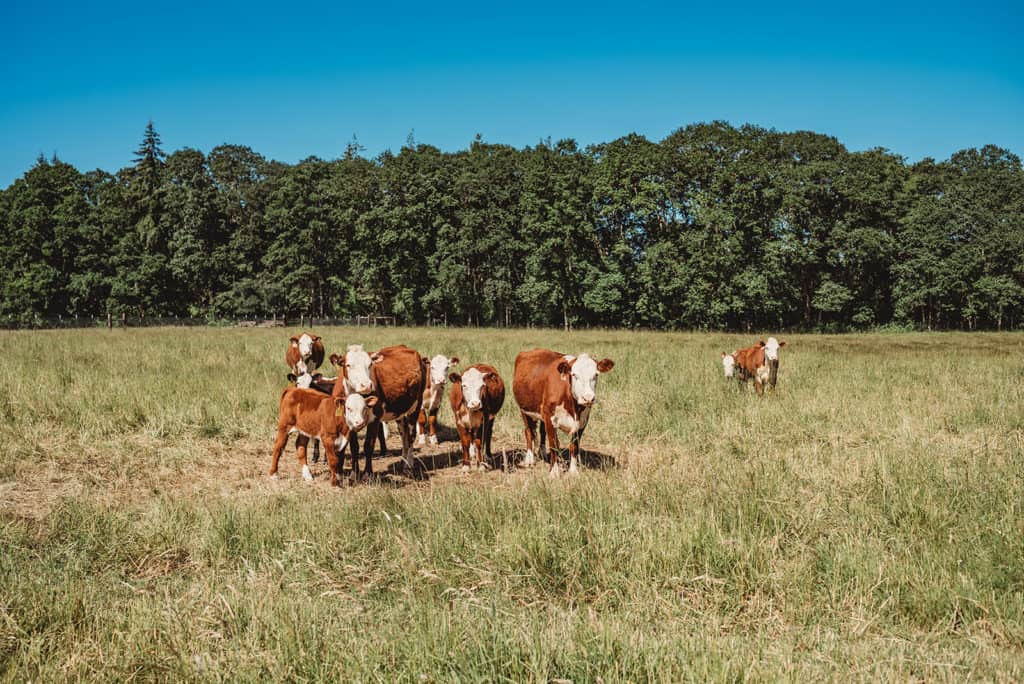As our team has been testing a wide variety of premium meat delivery services, a key distinction keeps coming up over and over again.
What is the concrete distinctions between Grass Fed versus Organic certified beef?
And more importantly, how should consumers weigh the tradeoffs?
Which one holds more value in terms of health benefits?
I’ll keep things short and get right to the point here:
What is the Technical Difference Between Grass Fed vs Organic Beef?
Put simply, grass fed is a loosely regulated label for beef that refers to the grazing process of HOW the cattle were nourished, whereas “Organic” is an actual ingredient certification process that any product must go through to be labeled as such.
Organic Labeling Standards
Organic labeling standards are more straight forward and directly regulated by the USDA. There are no “alternate” organic standards (there are other labels with stricter requirements, but not called “organic”).
As part of the USDA Organic beef criteria, no GMOs are allowed in grain or feed. This is not something I was fully aware as there’s a separate (non governmental) non-GMO label from the Non-GMO Project that you may see around.
Interestingly, there are actually 4 different organic certification standards from the USDA:

What was surprising to me was the distinction between “100% Organic” and just “Organic” which only needs to use 95% certified organic ingredients. This is not a distinction that I was aware of!
When shopping for organic beef, look for that “100% Organic” label to distinguish the highest standard.
And, there is only one USDA Organic label which applies to the highest two levels.

As a key distinction, USDA Organic has nothing to do with HOW cattle were grazed and only certifies based on 1) Non-GMO food sources, and 2) grain or feed sources.
Grass Fed Labeling Standards
While the USDA does enforce accurate labeling of “grass fed” beef, it is much more loosely regulated compared to the “organic” labeling standards.
Per the USDA guidance, the grass fed label can only be applied to products fed only grass or forage material and were not fed grain from a trough.
There are OTHER associations outside of the official USDA designation that do enforce stricter standards. This is what might lead to some of the confusion.
For example, the American Grass Fed Organization’s criteria to use their AGA label is:
- 100% lifetime diet of 100% forage
- Cattle raised in pasture, not confined
- Never treated with hormones or antibiotics

There are also some other grass-fed certifying organizations with their own standards which all vary a bit and have a different approval process.
- AGW Certification: A Greener World Organization has a more stringent criteria process and is an alternative to the AGA.
- PCO / OPT Certification: A somewhat less stringent certification program that does not meet the AGA standards, including only a 60% minimum requirement for grazing.
The Bottom Line: Unlike the organic label, grass-fed isn’t actively enforced by the USDA (just a guideline) and there are multiple independent certifying organizations. Personally, I look for the AGA or AGW label if available (PCO is still better than nothing, but not as stringent).

US Organic vs EU Organic
For the purposes of this definition, I’m referring to US agricultural standards per the USDA (can be controversial, yes). European standards are different, often more stringent, and ARE formally recognized as part of an equivalency program between the US and EU.
Some Grass Fed Beef Deliveries I Recommend
Given this discussion, here are some high quality grass fed beef services that I recommend:
- REP Provisions: REP is a new online purveyor that we recently tested & reviewed that is both grass fed / finished AND adopts the new trending “regnerative” designation (which also includes how the land is used / preserved). They have some amazing beef cuts & ground beef here.
- US Wellness Meats: This one is a long time stalwart in my go-to grass fed meat vendors, with a wide selection of beef cuts, all Non-GMO, Grass Fed, Grass Finished, and Pasture Raised.
Organic Beef Delivery Recommendations
And if you just want a quality USDA Certified Organic beef delivery option, check these out:
- Thrive Market: Thrive is like an online natural health food store with a wide variety of fresh produce, including well-priced organic beef cuts and ground beef. It is an online co-op, so you’ll need a membership to access the discounts, but it’s well worth it if you order more than 2-3 times per year. You also get 20% off your first order when you sign up.
- Organic Prairie: Another solid USDA Organic option from the same company behind Organic Valley dairy products.
- 7 Pretty Litter Alternatives - March 22, 2025
- 5 Best Kitty Litter Subscriptions - March 20, 2025
- Grass Fed vs Organic Beef: What’s the Trade Off? - March 22, 2024

